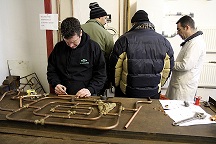So you've completed your trades training course and are now out in the world as a self-employed tradesperson. You've got your vehicle, all your tools and are ready for long and prosperous career ahead of you. You might feel relaxed, but even then there's is still the need to be vigilant about certain things.
Statistics from Commercial Vehicle Direct Insurance Services have revealed that tradespeople have lost over £75 million due to tool thefts from their vehicles since 2008. Tradespeople are a popular target for thieves, with the average value of their tool box being over £1900 according to claims made between the 1st May 2011 and 30th November 2013.
The survey found the areas hit by the most costly thefts in the last five years are:
- London Metropolitan - £30.6 million
- Yorkshire - £10 million
- Essex - £5.3 million
- West Midlands - £4.2 million
- Great Manchester - £2.9 million
Meanwhile certain places have also seen a significant rise in vehicle-related crime. Essex had it worse at a 68% rise, followed closely by Avon & Somerset (57%) and Greater Manchester (45%). At the bottom of the table was Suffolk (22%) and London Metropolitan, which only saw a 12% increase. The figures were obtained through a freedom of information request to UK police forces.
CVDIS director Andrew Jackson commented: "A tradesperson's toolkit is their livelihood and being without it for any period of time can be crippling. Of course, tradespeople must take precautions themselves, as leaving hundreds or sometimes thousands of pounds worth of tools in their vehicles can make them a target for thieves. But other actions are also needed."
So just remember to lock your vehicles up at night and whenever you're not around. While its not our intention to scaremonger, you never know when thieves are about! Not only that, but making sure you have the right insurance that covers everything could be the thing that saves your business should the worst happens. Even if you never use it, the security of having it there is not worth passing up.

National Apprenticeship Week is fast approaching, and the Chartered Institute of Plumbing and Heating Engineering (CIPHE) is just one of the many groups drawing attention to just how important that are to the trade industry.
With university degrees proving to be less helpful in the job market, its not surprising that so many young people are turning towards different career paths when leaving school. Stable jobs are getting tougher and tougher to get into as Britain slowly climbs out of the recession, and when an employer has to make cuts new graduates are usually the ones that suffer. By learning a trade such as plumbing, electrics or any sub-sector of the construction industry, young people are providing themselves with skills for life that are often in demand for more than the skills most degrees yield.
According to the Office of National Statistics, over a quarter of university graduates are earning less than school leavers on apprenticeships. Not only this, but a survey by BAE Systems and the Royal Academy of Engineering also highlighted just how beneficial trades training courses can be. Almost a third of respondants (29%) said that they now see training schemes as a viable option for their children. They also admitted that five years ago it was something they would have never even considered.

CIPHE CEO Kevin Wellmen stressed just how important apprenticeships, specifically calling them the "lifeblood of the industry" and saying that they should be given the respect they deserve. He added: "For too long they have been seen as a second-class route to a career. I believe that attitude is now changing."
However, he also commented that the plumbing and heating industry needs its apprentices to be of the highest standard, which they should aim toward by achieving an NVQ diploma. This will "ensure they have the right skills to tackle the challenges they will meet in the workplace".
And where can you achieve an NVQ qualification? Access Training Academies of course! Our intensive training courses provide all the skill and quality you'd find in a college course, but in a fraction of that time. The tutors are all experiences tradesmen themselves, all with a wealth of knowledge and experience to share with you in classes of no more than eight students to a tutor. With accredititation from the likes of City & Guilds, Logic, BPEC, NICEIC, the Gas Safe Register and more, you can rest assured that we put nothing short of 100% quality into all of our trade courses. To find out more, give our team a call on 0800 345 7492.
National Apprentice Week 2014 will take place from the 3rd to the 7th March. Stay tuned to this blog for more stories during that time!
It seems like almost every day we're posting about the ongoing construction boom and just how much its going to benefit new construction trainees, but the industry really is on the rise and the good news just keeps on coming!
 Now the latest CITB Construction Skills Network forecast is estimating that the industry is set to see 182,000 new jobs created over the next five years. This rapidly recovering market is led by increased housing demand, with skill shortages predicted across several occupations. In addition to this, planned new nuclear builds will also result in an increased demand for scaffolders over a period of at least four years.
Now the latest CITB Construction Skills Network forecast is estimating that the industry is set to see 182,000 new jobs created over the next five years. This rapidly recovering market is led by increased housing demand, with skill shortages predicted across several occupations. In addition to this, planned new nuclear builds will also result in an increased demand for scaffolders over a period of at least four years.
Over the next five years, this is how construction performance in the UK is expected to look:
- The South West, Wales and East Anglia will benefit to perform the strongest, at +3.5%, +3.4% and 3% respectively - all above the national average of 2.2%.
- Other areas will feel the effects much more slowly, but the North West (+1.3%), East Midlands (1.1%) and West Midlands (+0.8%) are all still set to improve.
- Employment growth is a lot more mixed. Some areas are set to see a notable growth (East Anglia is expected to increase by an average of 2% a year), while others may see a reduction (the West Midlands at 0.2%)
- Private housing will be the main drive for the growth, with the sub-sector rising by around 7% in 2014, with a further 5% the following year. From then on, its expected to grow by 4.6% a year until 2018.
- Infrastructure is set to have the second largest annual growth, at 3.6%, followed by industrial (3%) and public housing (2.2%)

CITB chairman James Wates commented that the report showed that the economy is "turning the corner" and that the construction industry is benefitting from that. However he also stated: "Growth needs to be sustainable; underpinned by long-term infrastructure projects and continued investment. Employment in 2018 is predicted to be 196,000 below pre-recession levels, which is why measures must be taken now to ensure growth is sustained over the long-term."
Do you need any further proof that now is the time to take up a trades training course and enter the construction industry? Over the next few years there is going to be increasing demand for bricklayers, carpenters, plasterers, tilers and painters/decorators. All of these professions are needed in order to meet the rising housing quota, and entering the industry as a qualified professional has never been easier. Access Training Academies offer quality, accredited courses in all of these trades at our state-of-the-art training centre just outside Cardiff city centre. Here you'll learn from our experienced tutors in classes no larger than eight students, permitting to work closely alongside your tutor. After learning the skills required to be a professional tradesperson, you'll be able to undertake the tests required to earn your qualifications right here at the centre. From there the construction world is your oyster - you can go and find employment in a larger company, or alternatively take the steps to set up your own business.
The best part is, these intensive courses will get you fully trained in a matter of weeks, as opposed to the few years it will take with a college course. That may sound like you're getting much less out of it, but our City & Guilds accreditation is a sure symbol that we don't skimp on any of the quality. To find out more about our range of course please fill in the online form found on this website or give us a call on 0800 345 7492. From there one of our course advisors will be happy to answer any outstanding questions you may have.
The construction boom is here, don't miss out!
While obviously the main part of gaining a great reputation as a plumber, electrician or any kind of tradesperson is to be fully qualified from an accredited training course, there are still other aspects you have to look at in order to make your business become a success. In the past we've looked at issues such as how your van looks, using social media and even how to handle missed calls. But now we come to another big part of today's modern age and how consumers will search for a competent tradespeople - the internet, or more specifically, websites.
 According to new research from digital marketing/website provider hibu, less than a third of construction firm websites are mobile-friendly. With 62% of adults in the UK now using smart phones and 83% having browsed the internet on their phone, this is proving to be a missed opportunity to reach a wider audience. Smart phones are quickly becoming the most common method of accessing the internet thanks to their portability and ability to be used on the go - and so in some ways its even more crucial to have your website mobile ready than it is laptop accessible.
According to new research from digital marketing/website provider hibu, less than a third of construction firm websites are mobile-friendly. With 62% of adults in the UK now using smart phones and 83% having browsed the internet on their phone, this is proving to be a missed opportunity to reach a wider audience. Smart phones are quickly becoming the most common method of accessing the internet thanks to their portability and ability to be used on the go - and so in some ways its even more crucial to have your website mobile ready than it is laptop accessible.
Hibu UK Chief Executive Officer Richard Hanscott said: "Anyone who has visited a website that isn’t mobile-friendly knows how frustrating – or even impossible – it is to browse and navigate it on their mobile device. With consumers increasingly searching local businesses on their smartphones and tablets, it’s crucial that firms have websites that are mobile-friendly so that they continue to attract customers and do not fall behind their competitors. Business owners may feel daunted by mobile technology but in reality they do not need any technical skills to ensure that their site works well and looks great on any device, or even optimised specifically for smartphone or tablet."
So once you've earned your qualifications and are heading out to become a self-employed tradesperson, a mobile friendly website is definitely something worth considering. If you find yourself struggling to do this, hibu have launched a business store specifically catering to those in need of one. The best part is that you can also take advantage of a 30-day free trial before signing up to the full service.

ELECSA and NICEIC operators NAPIT and Certsure have come together to create a single place consumers can go to find a fully qualifiied electrician. This easily identifiable mark will cover all full scope Part P registered electricians and is planned to roll out this year.
The two associations both created their own individual registers last year, but have since realised the advantages of creating a single one to avoid confusion. In addition to this, both feel that the attention given to the launches has proved a distracytion from key issues in the electrical industry - namely safety and quality. To overcome this, NAPIT and Certsure met back in November to discuss the way forward in terms of promoting competent, qualified electricians.
The proposal that has been put forward is anticipated to include all licensed Electrical Competent Person Scheme Operators in England and Wales who are approved by the DCLG to run an electricial certification scheme, who have been said to be "happy with the plans" in principle. The schemes will continue to operate individually in accordance with current Building Regulations, however they will now also promote the new quality mark as well as their own.
Emma Clancy, Chief Executive Officer of Certsure, said consumers will now benefit from a single point of reference, making it far easier for consumers to locate a registered electrician in their area. NAPIT Chief Executive Michael Andrews added that the new register will also "ensure that electrical installers continue to be able to take advantage of the choice and value for money that comes as part and parcel of healthy competition in the marketplace"
When becoming a fully qualified electrician, gaining your Part P qualification and joining a Competent Persons Scheme is an incredibly important step to take. It ensures consumers that you are fully qualified and able to perform electrical installations, setting you apart from the so-called "cowboy builders" that plague the industry. Not only that, but a Part P qualification allows electricians to self-certify their own work. This means you can sign off on any installations without having to inform your local building authority - saving you a considerable amount of money in inspection fees.
The Part P qualification, along with all electrical qualifications needed to become a full-time electrician, is available as an intensive course from Access Training Academies. If you would like the steps to become a fully-fledged electrician, take a look at the courses we have on offer and give us a call on 0800 345 7492 today.
The Green Deal has just had its first birthday, and unfortunately it hasn't been such a great year for the UK Government's flagship energy efficiency programme.
 Official figures have revealed that only 626 houses have live Green Deal plans in place, which is nowhere near the 10,000 figures minsters were expecting to be in place. As of December, only a total of 1,612 houses had made plans overall.
Official figures have revealed that only 626 houses have live Green Deal plans in place, which is nowhere near the 10,000 figures minsters were expecting to be in place. As of December, only a total of 1,612 houses had made plans overall.
While assessments had never really been on the rise, they notably declined by 21% during December, which the government attributed to the Christmas holidays. However several leading green energy groups have spoken out against the Green Deal's poor statistics, stressing that the Government needs to try a lot hard in order for it to succeed.
The Federation of Master Builders has given the first year of the Green Deal a "report card" rating of two out of five, commenting that is has "not achieved the desired results in its first full year, with the majority of SME installers and home owners failing to engage". Chief Executive Brian Berry called the financial package "unattractive to most consumers". He also went on to say how the programme simply doesn't stack up against other high-street money saving alternatives such as loans and credit cards available at more competitive rates. His suggestions to improve the Green Deal were:
"The single most effective measure to kick-start demand would be to reduce the rate of VAT from 20% to 5% on all domestic repair and maintenance work, including energy-efficiency improvements. This would be a real incentive to home owners across the board to think about getting a professional tradesperson in to quote on a variety of repair and maintenance projects."
Meanwhile the UK Green Building Council also had things to say about the figures, calling it a "a wake-up call to the Government" that it is not delivering. Chief Excutive Paul King suggested that the Government must "recognise energy efficiency as a national infrastructure priority and be prepared to delve into its purse to make its flagship policy more appealing through stronger incentives and more attractive finance options"
But despite its failings, the Government have announced that they plan to stick by the Green Deal, and believe that although its hard a slow start (to put it lightly) 2014 will definitely be the year it takes off. Climate Change minister Greg Barker "acknowledged" that things hadn't developed the way the government had anticipated at a conference yesterday, he still though its first year had been an "encouraging start".
He also commented that the supply chain was now in place, with more than 125 Green Deal providers at the ready along with 2900 individual advisers and 2300 organistations officially approved to carry out installations. Procedures are also set to be simplified by the newly established Green Deal Working Group, with further alterations and improvements to be announced over the coming weeks.
So will 2014 fare better for the Green Deal? It's too early to say, but if these numbers are anything to go by then it doesn't look like it can do much worse.
The construction industry continues to gather momentum as surveyors forecast a significant rise in Welsh house building in 2014.
 According to research direct from the Royal Institute of Chartered Surveyors (RICS), up to 79% more surveyors believe workloads are going to increase this year - the highest recorded number since numbers were first recorded 15 years ago. On top of this, 25% more surveyors said work on major building projects had grown in the last three months of last year - the most positive infrastructure figure seen in the last six years.
According to research direct from the Royal Institute of Chartered Surveyors (RICS), up to 79% more surveyors believe workloads are going to increase this year - the highest recorded number since numbers were first recorded 15 years ago. On top of this, 25% more surveyors said work on major building projects had grown in the last three months of last year - the most positive infrastructure figure seen in the last six years.
However it isn't all good news, as the survey also highlights concern over labour and material shortages - two factors that could very easily hold back the recovery.
In Wales alone 24% of surveyors admitted to struggling to recruit the skilled labourers they needed between October and December last year. During these months 40% also claimed that a lack of materials was also a significant problem - only this figure is representative of the whole of the UK rather than just Wales. 
RICS Wales chairman Neil Brierley remains optimistic about the situation though, as he sees this increase in building work across the country as "an excellent opportunity for future job opportunities, provided growth can be sustained". In agreement with the director of the Institute of Directors (IoD) in Wales Robert Lloyd Griffiths, who said nine out of ten members in the institute anticipate the growth being stronger than it was last year.
2014 is already proving to be a more perfect time than ever to join the construction trade. Job prospects are higher than ever, and as the industry continues to flourish so will your new career as a bricklayer, carpenter, plasterer or tiler. The construction trade offers many benefits that you might not find elsewhere and/or in your current place of work - better job satisfaction, quality of life, significant earning potential and most importantly JOB SECURITY (something that's even more evident in current circumstances).
Enrol on one of Access Training Academy's construction training courses and you'll be taught by our experienced teaching staff in a state-of-the-art centre. Our courses are all accredited by leading awarding bodies in the industry and you'll earn a professional level of skill in a fraction of the time a college course would take, along with all of the necessary qualifications.
To find out more about the construction training we have here at Access please view the course information pages on the left hand side of the website or contact one of our course advisers on 0800 345 7492.
Yesterday we wrote about research suggesting how much work plumbers stand to potentially lose from missed calls. However today pluming suppliers Plumbfix revealed that they are predicting a "social revolution" within the trade.
 Tradespeople in general, not just plumbers and heating engineers, are all beginning to see social media sites such as Twitter, Facebook and LinkedIn as a valuable and most importantly FREE way to advertise and create brand awareness. 8 out of 10 tradespeople are already using it as a way to reach more customers and two fifths believe having a page on a social media site will make them look more established. They don't even just use it for reaching customers, as a third of tradesmen even admitted to use it to check on their competitors and what services/prices they are offering.
Tradespeople in general, not just plumbers and heating engineers, are all beginning to see social media sites such as Twitter, Facebook and LinkedIn as a valuable and most importantly FREE way to advertise and create brand awareness. 8 out of 10 tradespeople are already using it as a way to reach more customers and two fifths believe having a page on a social media site will make them look more established. They don't even just use it for reaching customers, as a third of tradesmen even admitted to use it to check on their competitors and what services/prices they are offering.
Plumbfix's research revealed that almost half of tradespeople (48%) are already winning new business through Twitter and the like, and a larger proportion (68%) say their social media activity has increased since this time last year.
Sandra Everett, the senior marketing manager at Plumbfix, stressed the importance of small businesses getting to grips with social media as members of the public are more likely than ever to go online in search of a tradesperson."As plumbers increase the amount of business tasks and transactions they undertake online, social media should be seriously considered as a cost-effective way to market themselves to more and more customers."
It isn't just tradespeople that are hitting up social media either - trading bodies and contractors are also extending their Twitter and Facebook presence. Even Access Training Academies have Twitter, Facebook and LinkedIn accounts where any queries concerning our courses can be answered.
Via Installer Online

As we draw to the end of 2013 and all look forward to Christmas and the New Year, the staff at Access Training Academies would like to wish everyone a safe and happy holidays and a big thank you for all the support you've given us over the year. Access Training has continued to grow and provide the best trades training courses we possibly can. Look forward to more changes to our plumbing, electrician, gas and construction courses next year to make them even better, and we'll look forward to having you come and train with us.
Student training will resume on the 6th January, but in the meantime we have already started booking places for courses in 2014. If you fancy yourself as a bit of a handyman and would like to take it to the next step and become a professional tradesman, take the time to browse our website and have a look at the courses we offer.You can also get more information by calling 0800 345 7492 or alternatively filling in the information form found to the side of the page. Your details will be passed on to one of our professional course advisers who will be happy to answer any questions you might have.
It's a brand new year, and the perfect time for a brand new career.